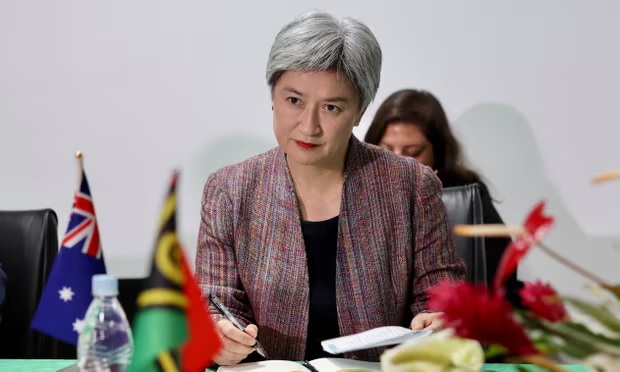The new prime minister of Vanuatu has flagged he wants to rewrite a security pact his predecessor signed with Australia, saying parliament is unlikely to ratify the agreement in its current form.
Sato Kilman — who has served as prime minister of Vanuatu four times previously — was elected on Monday after a court in Vanuatu upheld the results of a no-confidence motion against the previous prime minister Ishmael Kalsakau.
But Kalsakau’s opponents warned that the agreement could undermine Vanuatu’s relationship with China, while Kilman — who served as Kalsakau’s deputy for six months — accused the former prime minister of failing to consult his council of ministers before signing it.
The agreement was signed by Penny Wong in December last year, and was hailed by some analysts as a major strategic victory for Australia, which is trying to reinforce its security ties with several Pacific nations in the wake of China’s security pact with Solomon Islands.
But Kilman told the ABC that he was “not sure” whether the pact was “in the best interests of Vanuatu or not”.
“I think at some point the government will need to revisit the thing, to see whether it is a good thing for Vanuatu or not,” he said.
“If it is not all good, and there needs to be some changes, then we speak with Australia to see what we can do together to make it something workable.”
The new prime minister later said he believed it would be “difficult” to secure ratification for the agreement from Vanuatu’s parliament, suggesting it would have to be reworked for it to pass into law.
“So, my view would be to revisit the agreement with both sides, the Australians, and the Vanuatu government, and see if there’s any sticking points and then address that,” he said.
Tess Newton Cain from the Griffith Asia Institute said Kalsakau’s government had already moved to “substantially” rewrite the pact, and that progress on it would likely be slow.
“It is likely that if and when it is next discussed at government-to-government level, it would look quite different to what was signed last year,” Dr Newton Cain told the ABC.
“My prediction is that it will remain on a slow roll.”
In a statement, a spokesperson for the Department of Foreign Affairs and Trade (DFAT) said Australia shared a “deep security partnership” with Vanuatu, and would continue to work with the Pacific Island country “to deliver mutual benefits and ensure our shared security.”
“Australia respects Vanuatu’s sovereign decision-making processes, including in relation to the Bilateral Security Agreement that began in 2018 and was signed in 2022,” they said.
“We are looking forward to discussions with the new Vanuatu Government on all areas of cooperation — including their views on the Agreement — to ensure we address the needs of both countries.”
The prime minister rubbished suggestions that he represented a “pro-China” bloc of MPs in Vanuatu, or that Kalsakau could be fairly characterised as “pro-West”, saying that characterisation was simplistic and “totally wrong”.
“We are not pro-West, and we are not pro-Chinese. We adopt a non-aligned policy,” he said.
“We now live in a very dynamic, geopolitical landscape … where each country must be able to decide how they deal with that for the best interest of their countries.”
The new prime minister’s majority remains narrow, and some MPs in Vanuatu are predicting that the new government could well face its own no-confidence motion before too long.
Kilman’s last term in office was also plagued by corruption, with 14 sitting members of parliament — including the deputy prime minister and speaker — sentenced to prison on corruption and bribery charges.
But the new prime minister told the ABC he wanted to push ahead with his proposal for a new integrity bill which he said would reduce corruption and help stabilise politics in Vanuatu, in part by subsidising political parties in the country.
“One of the priorities for me … would be to try and speak to all political leaders [on the bill],” he said.
“If I can do that, and we can come to some agreements on issues in that bill, and if we can get it passed in parliament, that would be a big step forward to maintaining and having a stable government in Vanuatu.”
Dr Newton Cain said that similar reforms had been discussed for a long time in Vanuatu, but “so far there has yet to be sufficient consensus to get measures such as these across the line”.
“Passing a law is one thing — without appropriate architecture, resources and commitment to apply and prosecute the law it is likely to be meaningless,” she said.
“Also if the various checks and balances are applied to political parties then what we will likely see (as we did in Solomon Islands) is an increase in people standing as independents to avoid the scrutiny — of course this would also mean they would miss out on the benefit of receiving funding.”
During a previous tenure as prime minister in 2012, Kilman expelled 12 Australian Federal Police officers from Vanuatu after he was stopped while transiting through an Australian airport and his adviser was arrested by Australian police on tax fraud charges.
SOURCE: ABC PACIFIC/PACNEWS














